The Week – 04 May 2018
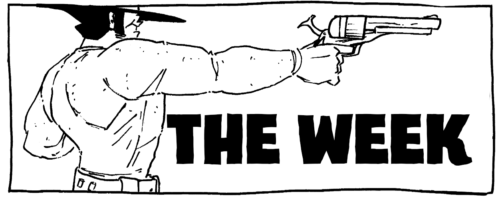
LONG JOHN UPDATE:
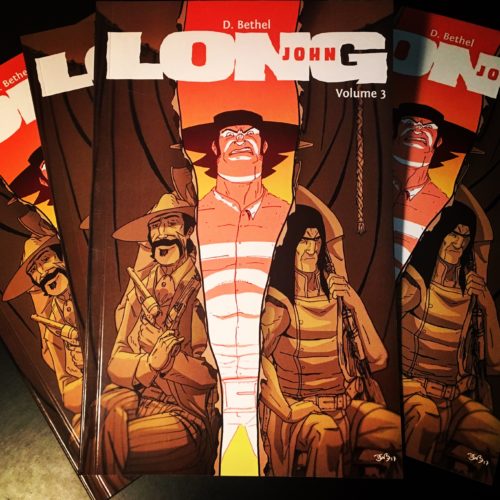
Volume 3 is in-hand and will debut at this year’s Free Comic Book Day Festival (Saturday, May 5) at Empire’s Comics Vault in Sacramento.
In a sense, these updates are basically done as the books are here and in-hand! However, we’re not entirely done, as I’ll keep the updates going until we get ready to post new pages to the website. I’ll bring a start date soon, but it won’t likely be until the beginning of June. But that’s getting away from the exciting stuff: books!
Though they’re not on the website yet, they’ll be debuting this Saturday (tomorrow, 5/5) at Free Comic Book Day. Like last year, I’ll be a guest at Empire’s Comics Vault in Sacramento where it’ll be a huge event. Local artists selling their wares. Pro Wrestling. Cosplay. Food Trucks. And, of course, free comics. It has always been a blast and I can’t wait for tomorrow.
The book will be up for sale on Etsy shortly, but it will have to wait until after Free Comic Book Day (and I’ll be getting a mountain of grading next week––though it’ll be the final mountain to climb before the break for summer). I’ll do a run-down on the books a bit later, but for now know this: they’re wonderful. I’m really happy with how they turned out. From the new colors being used in the book to double-page spread (for real!), to having an actual illustrated cover, RA Comics Direct did a fantastic printing and binding job on this new book.
I’ll likely talk more about this week’s preview panel when the page actually comes up, but it is emblematic of a lot of how this issue turned out. Like most artists, I’m hyper-critical of my work, but this panel, in inks, actually turned out pretty well. When I sat down to color it, though, I did some experimentation and had some fun, and the result even more fully captures what I thought had captured in the original inks. I should play with high contrast art maybe in a future Long John chapter or in a future project; either way, it was super fun to do and made me realize how important shadows are to this book.
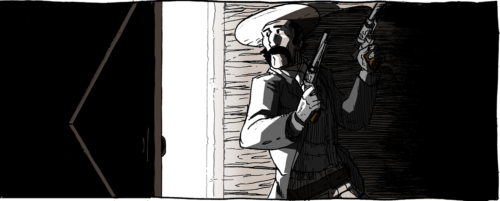
READING:
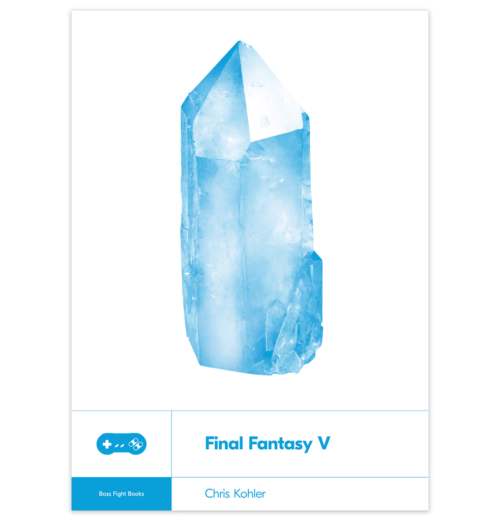
source: Boss Fight Books
It is rare when I get the chance to read a book during the school year. It’s even rarer when I become enthralled by one (I was never much of a reader to begin with). It’s rarer still when I finish a book. Sadly, I don’t read much fiction anymore; but the non-fiction I do read––and enjoy––is that which has a strong narrative sense to it: a beginning, a middle, and an end. Something that trades in metaphor when appropriate and weaves theme throughout the book. I’m not specifically referring to the style of “literary non-fiction” (in fact, one book that I’ve been trying to read is in that style and I find it a slog), instead, I mean a book that’s well-constructed. One where the author has something to say aside from simply the content. If video games are involved, then all the better.
Chris Kohler is a games journalist with a strong storyteller’s eye. His first book, Power Up: How Japanese Games Gave the World an Extra Life, I tore through as well, bolstered by the fact that he was specifically talking about games I (and he) grew up playing. But it wasn’t just the subject matter as it was his sharp, focused, and clear voice that held me all the way through (though I’ll admit my eyes got a little glassy during the Pokémon chapter, as it was a series a bit after my time).
His newest book from the incomparable publisher, Boss Fight Books, grabbed me from its announcement. Boss Fight Books puts out an interesting mix of criticism, narrative, and personal essays that make it as much a treasure trove as it is also a mixed bag. Of the three ingredients, I skew more toward the first when it comes to writing about video games, and (based on the excerpts the publisher provides) I get wary when the books veer too much into the other two lanes. Boss Fight publishes little books, each one centering around a single game. It’s fascinating because they allow the writers to take their own angle on the book which makes for a unique and often engaging experience about games that most readers, surely, have already formed pretty strong, personal stances and interpretations.
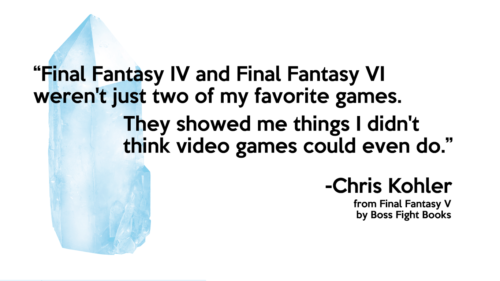
However, I am a big fan of the first wave of Final Fantasy games. As a series, it released its fifteenth installment last year, though many fans could tell you that it is kind of the last of the most recent wave of Final Fantasy games (or, with hopes, the first of a new wave). The first wave constitutes the first six games in the series (all the numbered installments of the series are standalone stories with no real continuity from game to game), though, during my impressionable youth, only three of those ever came stateside and which form a foundational triptych of my psyche: Final Fantasy, Final Fantasy IV (released in the USA as Final Fantasy II), and Final Fantasy VI (Final Fantasy III, in the US).
Kohler’s book about the “lost” Final Fantasy game so completely captures what the series meant and means to me (I stopped playing the series after the twelfth game, albeit skipping the online-only Final Fantasy XI) but is also a fantastic look at his growth as a gamer and a writer (it seems we are around the same age) AS WELL AS a fantastic piece of gaming criticism. Even though I played through Final Fantasy V a few times, it didn’t really stick with me; however, I know it––and the series––well enough to have every page of Kohler’s book hit me square in both the nostalgia and analytic centers of my brain. It’s nice not having to compromise on a piece of writing about something I have such a personal and academic fondness for.
To further cement how rare it is for me to not only start, read, and finish a book: I bought this with the idea that I’d read it over the summer, but one day I decided to read the first chapter. A week later, I finished the thing.
Write more books, Mr. Kohler.

Discussion ¬